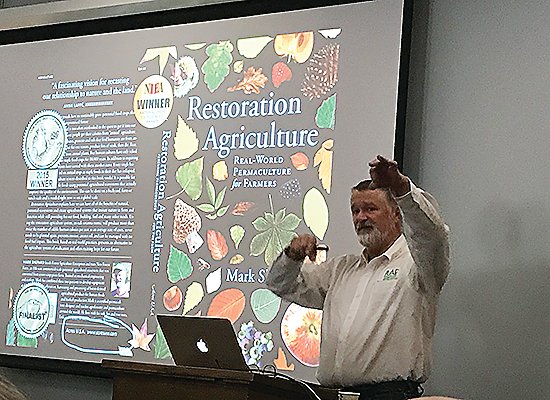Support the Timberjay by making a donation.
Speaker advocates “permaculture” farming
MT. IRON— Could northeastern Minnesota be growing more of its own food locally? According to Mark Shepard, of Restoration Agriculture Development, it’s not a question of could, it’s a question …
This item is available in full to subscribers.
Attention subscribers
To continue reading, you will need to either log in to your subscriber account, or purchase a new subscription.
If you are a current print subscriber, you can set up a free website account and connect your subscription to it by clicking here.
If you are a digital subscriber with an active, online-only subscription then you already have an account here. Just reset your password if you've not yet logged in to your account on this new site.
Otherwise, click here to view your options for subscribing.
Please log in to continue |
Speaker advocates “permaculture” farming
MT. IRON— Could northeastern Minnesota be growing more of its own food locally? According to Mark Shepard, of Restoration Agriculture Development, it’s not a question of could, it’s a question of must.
“We don’t need more studies,” Shepard said as he delivered the keynote address at the annual Iron Range Earth Fest, held here this past weekend. “This is a call to action!”
Shepard, who wrote the book, “Restoration Agriculture,” isn’t just spreading the word about growing more food locally. He’s also arguing that humanity needs to start growing food differently.
For centuries, Shepard said, human agricultural required destroying vast areas of diverse natural habitat in favor of monoculture plantings, mostly of annual grains.
“The question is, how do we feed ourselves without destroying the planet we live on?” he said.
In his high-energy, sometimes scattershot, presentation, Shepard took the roughly 60 people who turned out to hear him on a wild ride, highlighting the vast number of threats that the planet and humanity face from the necessity of feeding an ever-growing number of people at a time of increasing climate instability.
The answer, according to Shepard, is using a method of food production known as permaculture or polyculture, which relies much more on long-lived plant species, such as trees and shrubs, to produce food products. Permaculture methods also, typically, call for planting a greater mix of plant species to provide for plant diversity.
Shepard argues that growing tree crops, like nuts and fruits, with grass underneath to provide forage for grazing animals, is a far less energy intensive and more sustainable approach to food production.
It’s not only a way to feed ourselves, said Shepard, it’s a way to heal a planet that has suffered from mankind’s abuses. “Nature knows how to repair itself,” Shepard said, sounding a hopeful note. “But we have to understand how natural systems operate and work with them rather than against them.”
Implementing a permaculture food system requires understanding your local biome and dominant plant communities and using species that will do well in those conditions. He said animals are an important part of most natural systems and should be incorporated into any permaculture system. Shepard is familiar with that process, having developed New Forest Farm on 140 acres he owns near Viola, Wis. It’s become a showplace for his proselytizing about permaculture and it’s an operation that now provides a comfortable living, he said. “I’m not recommending becoming eco-peasants,” he quipped.
While Shepard’s talk was long on inspiration, his hour-long keynote was a bit light on the details, although he said his operation provides fruits like apples and grapes, as well as hazelnuts, chestnuts, and edible mushrooms.
You can find out much more by searching for Mark Shepard on the web or buying his book, Restoration Agriculture, available at Amazon, for $24.






